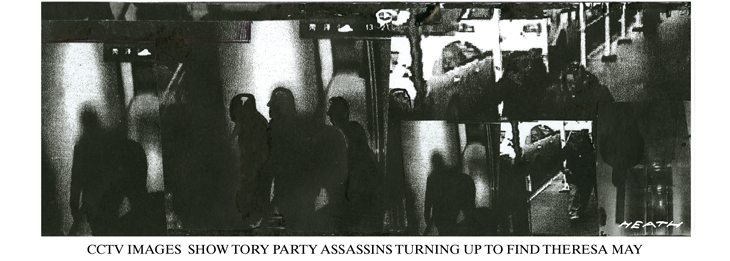Home
Theresa May, the Prime Minister, found herself in another crisis over Brexit. Backbenchers whispered that 48 letters were being collected to present to the chairman of the 1922 Committee to trigger a vote of confidence. What annoyed some of her own MPs was a scheme (intended to make less likely the imposition of a backstop agreement over the Irish border) to extend by up to a year the Brexit implementation period that was supposed to end on 31 December 2020. During an emergency cabinet conference-call, Esther McVey, the Work and Pensions Secretary, was said to have told Mrs May that she was ‘devastated’ by the provision. An unnamed Conservative former minister told the Sunday Times: ‘The moment is coming when the knife gets heated, stuck in her front and twisted. She’ll be dead soon.’ It was unclear what the heating signified, but the formulation was criticised; Yvette Cooper called it ‘vile and dehumanising language towards a woman MP’.
Mrs May told the Commons that ‘95 per cent of the withdrawal agreement and its protocols are now settled’. Organisers of a march through London calling for a People’s Vote (a referendum on Brexit) said that 700,000 people had turned out. Jeremy Corbyn, the leader of the Labour party, was not able to join them, as he was in Geneva exercising solidarity with Chileans. Sir Nick Clegg, the former deputy prime minister and leader of the Liberal Democrats, got a job as vice-president of global affairs and communications at Facebook with a seven-figure salary. Britain’s annual deficit was reduced by an annual £13 billion through revisions to the independent Office for Budget Responsibility’s forecasts, giving Philip Hammond, the Chancellor of the Exchequer, leeway in his Budget on 29 October. The sale of Wembley stadium fell through. Waterloo Station was paralysed by strikes and signal failures. Dyson was to make electric cars in Singapore. John Lewis stopped selling DVD players.
Amere Singh Dhaliwal, 35, the leader of a gang of 20 British Asians mainly of Pakistani heritage, who raped and abused girls from Huddersfield between 2004 and 2011, was jailed for life with a minimum of 18 years. The girls, as young as 11, had been targeted for their vulnerability; one was abducted from a care home. The men, jailed for between five and 18 years, were convicted in three trials subject to reporting restrictions since November 2017. The second trial was in danger of being upset when Tommy Robinson, the former leader of the English Defence League, filmed defendants outside the court; an allegation of contempt of court against him was this week referred to the Attorney General. The King and Queen of the Netherlands made a state visit to Britain.
Abroad
Saudi Arabia, which had been denying that Jamal Khashoggi, a journalist living in America, was murdered in its consulate in Istanbul, then said he had died there after ‘a fist fight’. This week the Saudi Foreign Minister said: ‘We are determined to punish those who are responsible for this murder.’ Turkish officials were reported to possess audio and video recordings of Khashoggi’s torture and death. President Recep Tayyip Erdogan of Turkey said the killing had been planned days in advance. President Donald Trump said there had been ‘lies’ but resisted calls for the US to stop arms sales to Saudi Arabia.
President Trump said that America would withdraw from the Intermediate-Range Nuclear Forces Treaty with Russia, because Russia had long been violating it. John Bolton, the US National Security Adviser, who had recommended withdrawal, visited Russia for talks. A caravan of thousands of migrants from Honduras, El Salvador and Guatemala was allowed into Mexico, and declared its intention of entering the United States, 1,000 miles away. An express train mowed into a crowd of festival-goers at Amritsar in India, killing 58; the burning of an effigy of the demon king Ravana filled with firecrackers meant revellers on the line could not hear the train’s approach.
The European Commission instructed debt-burdened Italy to revise its budget, which it said displayed ‘serious non-compliance’. China opened the world’s longest sea bridge, spanning 34 miles, from Hong Kong to the mainland via Macau. Japan and the European Space Agency (of which Britain is a member) launched a spacecraft to Mercury expected to arrive in December 2025. A 75ft Greek merchant ship more than 2,400 years old was found 6,500ft beneath the Black Sea. CSH






Comments